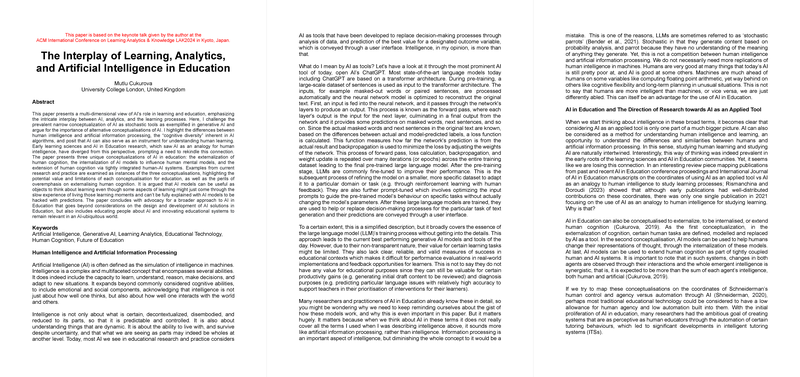The Interplay of Learning, Analytics, and Artificial Intelligence in Education: A Critical Examination
Introduction
In the sphere of education, the integration of AI with learning analytics represents a significant shift towards understanding and optimizing the learning process. Cukurova's extensive examination, delivered at the ACM International Conference on Learning Analytics & Knowledge LAK2024, explores the nuanced interrelation between AI, analytics, and learning. Through a critical lens, this paper challenges the reductionist view of AI as mere stochastic tools and advocates for a broader understanding, notably through the lenses of externalization, internalization, and extension of human cognition by AI.
Human Intelligence vs. Artificial Information Processing
The discussion initiates by contrasting human intelligence's complexity with the current operations of artificial information processing systems, such as LLMs including ChatGPT. Highlighting the limitations inherent in tools that simply mimic decision-making through data analysis and prediction, Cukurova underscores the rich, multifaceted nature of intelligence that extends beyond computational capabilities to include emotional and social competencies. This section eloquently argues for the appreciation of the cognitive diversity AI models bring into educational contexts, suggesting their potential not only as tools but as mediums for deeper understanding of human cognition.
AI in Education: Beyond Tool Application
Delving into the educational sector, the paper revisits the history and evolution of AI’s role within it, noting a drift from early congeniality between learning sciences and AI towards a narrower application of AI as tools. The author introduces three conceptualizations: AI as tools for externalizing cognition, AI models for internalization and influence on human mental models, and AI as extensions of human cognition. Each conceptualization is dissected, offering insights into practical applications, potential benefits, and inherent limitations, drawing attention to the importance of maintaining a balance that fosters enriched learning experiences without over-reliance on AI's decision-making capabilities.
The Intricacies of AI Implementation in Educational Systems
This section provides a critical overview of the slow adoption and implementation of AI in mainstream education, attributing the sluggish pace to multifaceted challenges encompassing policy landscapes, institutional governance, and the socio-ethical implications of deploying AI in educational settings. The discourse extends into an intriguing analysis of intelligent tutoring systems (ITSs), highlighting their successes and limitations within real-world educational settings and advocating for nuanced, context-aware integrations of AI that resonate with the complex dynamics of learning environments.
Potential Futures: Education in an AI-Dominant Era
Speculating on future developments, the paper addresses the broader implications of AI's ubiquity in education, emphasizing the importance of educating future generations about AI and innovating educational systems to adapt to AI-driven changes. Here, particular attention is given to rethinking assessment methods, advocating for process-oriented evaluations that better align with the objectives of education in fostering critical thinking, creativity, and adaptability among learners.
Conclusions and Future Directions
In conclusion, Cukurova's paper serves as a compelling call to action for researchers, educators, and policymakers to reevaluate and broaden their perspectives on AI’s role in education. By moving beyond a tool-centric view towards conceptualizing AI as a catalyst for understanding, augmenting, and expanding human cognition, the paper sets the foundation for future explorations that could lead to more holistic and impactful educational practices in an AI-integrated world.
Acknowledgements and References
Finally, the paper's acknowledgments and extensive references provide a window into the collaborative nature of scholarly research and offer readers a comprehensive resource for further exploration into the intersections of AI, learning analytics, and education.
